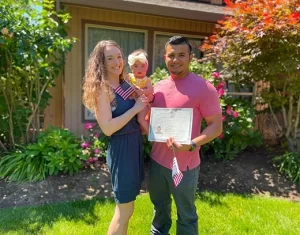Am I Already a US Citizen Even Though I was Born Outside the U.S.?

The U.S. proudly maintains its practice of “birthright citizenship” which means that those born within the country’s borders are automatically U.S. citizens. However, for those of you born outside the U.S., you may still already be a U.S. citizen depending on several factors.
The starting point for determining if you already possess U.S. citizenship is your date of birth. Your age is the key issue involved in knowing which rules apply to you. The law has changed quite a bit over the decades and the general rule is that the law in effect when you were born is what applies to you. For those wondering about citizenship through parents or exploring automatic citizenship scenarios, it’s crucial to understand the specific laws that were in place at your time of birth.
The conditions for derived citizenship or citizenship by descent might be applicable, especially if you are seeking clarity on citizenship through parents after 21 or if your parent naturalized before you turned 18.
A key date to keep in mind is February 27, 2001, when Congress enacted the Child Citizenship Act (CCA). If you were born after that date or were under 18 years old on that date, then the CCA applies to you. This law streamlines the rules and thankfully is an improvement over the prior, more confusing rules – which you will have to investigate if you were over 18 back in 2001.
For individuals trying to determine if they meet citizenship through parents being naturalized criteria, the CCA provides a clear path. The act has made it significantly simpler for those who were minors at the time to acquire automatic citizenship after 20 years, provided they met certain residency and parental status requirements.
Also Read: Unlocking Citizenship: Residency Conditions & Naturalization
If you were born after February 27, 2001, or you were 17 or younger on that date, and you were born outside the U.S., once the following conditions are met, you will have automatically acquired citizenship under the CCA:
• You have at least one parent who is a U.S. citizen through birth or naturalization. Your adoptive parent who is a U.S. citizen certainly counts as well.
• You, the child, are under 18 years old.
• You are already a U.S. permanent resident.
• You live in the U.S. in both the legal and physical custody of your U.S. citizen parent.
Once all of those conditions have been met, then according to the CCA, you will immediately and automatically become a U.S. citizen! This automatic process, however, requires that you confirm and document your status. For those who apply for foreign citizenship, understanding your U.S. citizenship status is crucial before making any applications that could affect your U.S. citizenship.
Keep in mind, however, that USCIS requires that you prove all of these steps occur and will not automatically send you a Certificate of Citizenship. Instead, you have to apply for this Certificate of Citizenship using Form N600 and provide documentation proving you indeed did meet all of the necessary elements of the CCA. Quite often it is challenging to gather and present all of the required evidence if you are already over 18 and living on your own. The prerequisite of living in your U.S. citizen’s legal and physical custody is often the trickiest item to document.
This documentation process can be particularly daunting for those who might not have immediate access to all necessary records, such as a naturalization certificate or proof of permanent residency. It’s advised to start gathering these documents early if you intend to apply for citizenship through marriage or other means as an adult.
For those who do not qualify to automatically acquire citizenship under the CCA because you were born before the eligibility date and sadly are not young enough, you instead need to look at the specific law in effect on your birth date. This area of law – the acquisition or derivation of citizenship – is notoriously challenging and there are quite a few detailed charts that need to be consulted to make sure you are applying the correct law for your situation.
Navigating this complex area of law often requires consulting with immigration professionals or legal advisors, especially if you are considering applying based on citizenship through parents after 18 or other age-specific criteria. Derived citizenship can be a complicated process but understanding your eligibility under laws like the former INA 321 is critical.
In general, former INA 321 applies to children who were already 18 years of age on February 27, 2001, but who were under 18 years of age in 1952, when the current Immigration and Nationality Act became effective.
In general, a child born outside of the United States to two alien parents, or one alien parent and one U.S. citizen parent who subsequently lost U.S. citizenship, acquires citizenship under former INA 321 if:
• The child’s parent(s) meet one of the following conditions:
o Both parents naturalize;
o One surviving parent naturalizes if the other parent is deceased;
o One parent naturalizes who has legal custody of the child if there is a legal separation of the parents; or
o The child’s mother naturalizes if the child was born out of wedlock and paternity has not been established by legitimation.
• The child is under 18 years of age when his or her parent(s) naturalize; and
• The child is residing in the United States under a lawful admission for permanent residence at the time the parent(s) naturalized or thereafter begins to reside permanently in the United States. These specific conditions underscore the importance of understanding how U.S. immigration laws apply to those born abroad but who may still have a claim to U.S. citizenship through their parents’ actions or statuses.
